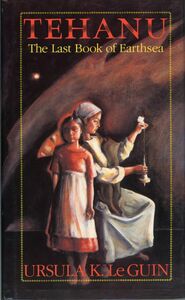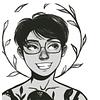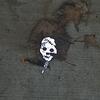Take a photo of a barcode or cover
dark
emotional
inspiring
reflective
slow-paced
Plot or Character Driven:
Character
Strong character development:
Yes
Loveable characters:
Yes
Diverse cast of characters:
Yes
Flaws of characters a main focus:
Complicated
adventurous
dark
mysterious
reflective
sad
tense
fast-paced
Plot or Character Driven:
Plot
Strong character development:
Yes
Loveable characters:
Yes
Diverse cast of characters:
Yes
Flaws of characters a main focus:
Complicated
This one was also good and definitely marked a shift in Earthsea's pattern of things; it's definitely the start of a different part of the series, like a second trilogy within the sextet. The difference in writing style threw me off a bit, with all the half-started sentences, and made it a little less than the usual 4 for me.
Graphic: Misogyny, Fire/Fire injury, Injury/Injury detail
Moderate: Child abuse, Child death, Death, Violence, Death of parent
Minor: Sexual assault, Sexual violence, Xenophobia
A profoundly human fantasy story, following the twilight years of young heroes after their “happily ever after” faded, in a fading world shaped by their actions.
A truly stunning look at aging, dying, legacies and what it means to outlive the different lives you’ve had. Somehow, despite being decades old, every book by Ursula is a breath of fresh air into the genre. There really isn't any one like her. And this might just be my favourite.
A truly stunning look at aging, dying, legacies and what it means to outlive the different lives you’ve had. Somehow, despite being decades old, every book by Ursula is a breath of fresh air into the genre. There really isn't any one like her. And this might just be my favourite.
The most proper and fitting subversion of the typical hero-trope fantasy I’ve ever read. I keep thinking it couldn’t get better, and then Le Guin goes
challenging
emotional
reflective
relaxing
tense
fast-paced
Plot or Character Driven:
Character
Loveable characters:
Yes
Best Earthsea yet.
adventurous
challenging
dark
hopeful
reflective
slow-paced
Plot or Character Driven:
Character
Strong character development:
Yes
Loveable characters:
Yes
Diverse cast of characters:
Yes
Flaws of characters a main focus:
No
challenging
sad
tense
slow-paced
Plot or Character Driven:
Character
Strong character development:
Yes
Loveable characters:
Complicated
Diverse cast of characters:
Yes
Flaws of characters a main focus:
Yes
My feelings about this book were a rollercoaster as I read it, about everything from the writing, to the characters in conversation with each other, to the qualities of the story. Le Guin's own reflections on the book were super helpful in leaving me in a positive place, reassured that she doesn't buy into the gender dynamics and "this is feminine, that's masculine" that repressive hierarchies have established and insist are innate. Her characters are always looking for a way to be whole in spite of social order, not through or even within it.
This was a nice subversion on the series so far. Earthsea, in my view, has been challenging fantasy norms throughout its entries, and in this one, LeGuin challenged the patriarchal hegemony that is pervasive in fantasy novels.
There is often a conflation between strong female characters and supernatural power. I don't think strong female leads need to be more abled than the male characters in the same genre to be considered strong. LeGuin's use of her female leads in this book was my favorite part of the story. They are normal women who are powerful in personality, who exist not subservient to the men in the story, but as their own beings with ambition and otherwise. I teared up any time Tehanu said anything at all.
There is often a conflation between strong female characters and supernatural power. I don't think strong female leads need to be more abled than the male characters in the same genre to be considered strong. LeGuin's use of her female leads in this book was my favorite part of the story. They are normal women who are powerful in personality, who exist not subservient to the men in the story, but as their own beings with ambition and otherwise. I teared up any time Tehanu said anything at all.
The internet effectively killed my interest in television and film, at least in its pop-cultural form, through the influence of one nefarious website: tvtropes. When I was twelve and thirteen I cared about nothing more than amassing scores of meaningless trivia about media I had never seen or engaged with beyond the description attached to respective tvtropes pages. It was like discovering a wikipedia for lazy pseudointellectual people - I could devour things which took the forms of facts but were really meaningless buzzwords with no academic rigor applied. I used to read spoilers for fun, and when talking about an anime or videogame with my friends as a teenager, could never overcome the temptation to spoil elements of a plot I'd never engaged with directly. Tvtropes is really bad, and although my warning might've only been useful if it had been given to myself, way back when, it is necessary for me to write it so here.
How is this relevant to Tehanu? It's simple - I looked at the Earthsea tvtropes page several years before I read the books, and through the tone of that article alone, had significant prejudice about this book before I'd opened it. The invented terminology and house style of tvtropes meant that many baseless opinions awkwardly expressed became unconscious facts to my uncritical gorging mind. And tvtropes said this is 'the feminist one' which is too preachy and not as mindlessly fun as previous Earthsea books. A dull complaint, one I'd dismiss immediately if I came across it now, but my younger self was too open to bad criticism.
Tehanu is not the feminist Earthsea novel. Le Guin isn't really becoming markedly more political than she is in other books, like The Dispossessed and The Left Hand of Darkness. It is a departure from the mythic epic format that influences A Wizard of Earthsea and The Farthest Shore (which was good but a bit too similar to the first book), but it's not as if this book is a radical departure from what was developed in the Earthsea cycle either.
Politics can, occasionally, have a negative influence on a story if they are poorly expressed, but it's quite a serious accusation, in my view, to claim that the political narrative supersedes the narrative-narrative of a story at all. What certain critics decide is 'political' is not to be accepted lightly. It would be truly strange and enormously privileged to believe that the aesthetic and the political have different purposes in life, are clearly delineated, and should stay that way. Maybe that would be nice, if it were true!
Tehanu is a good book, probably the best Earthsea so far. I'd only recommend someone read it if they have read the previous books, but I think a mature fan of them would find this novel especially poignant and powerful. This is the last book in a omnibus I bought of the first four Earthseas, and until I finished this one, I figured I wouldn't read any more. The ending is certainly satisfying enough for me to stop here, but if Le Guin's short stories and final novel are to the quality of Tehanu, I'll have to seek them out.
How is this relevant to Tehanu? It's simple - I looked at the Earthsea tvtropes page several years before I read the books, and through the tone of that article alone, had significant prejudice about this book before I'd opened it. The invented terminology and house style of tvtropes meant that many baseless opinions awkwardly expressed became unconscious facts to my uncritical gorging mind. And tvtropes said this is 'the feminist one' which is too preachy and not as mindlessly fun as previous Earthsea books. A dull complaint, one I'd dismiss immediately if I came across it now, but my younger self was too open to bad criticism.
Tehanu is not the feminist Earthsea novel. Le Guin isn't really becoming markedly more political than she is in other books, like The Dispossessed and The Left Hand of Darkness. It is a departure from the mythic epic format that influences A Wizard of Earthsea and The Farthest Shore (which was good but a bit too similar to the first book), but it's not as if this book is a radical departure from what was developed in the Earthsea cycle either.
Politics can, occasionally, have a negative influence on a story if they are poorly expressed, but it's quite a serious accusation, in my view, to claim that the political narrative supersedes the narrative-narrative of a story at all. What certain critics decide is 'political' is not to be accepted lightly. It would be truly strange and enormously privileged to believe that the aesthetic and the political have different purposes in life, are clearly delineated, and should stay that way. Maybe that would be nice, if it were true!
Tehanu is a good book, probably the best Earthsea so far. I'd only recommend someone read it if they have read the previous books, but I think a mature fan of them would find this novel especially poignant and powerful. This is the last book in a omnibus I bought of the first four Earthseas, and until I finished this one, I figured I wouldn't read any more. The ending is certainly satisfying enough for me to stop here, but if Le Guin's short stories and final novel are to the quality of Tehanu, I'll have to seek them out.
a departure from the original trilogy in some/many ways but I still loved it!!! it's about the adventures of an 'ordinary' woman's life.






